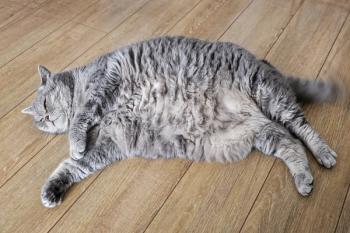
Psychogenic problems could explain feline food frenzy
Veterinary researchers conclude that cats who are obsessed with food could be suffering from psychogenic abnormal feeding behavior.
If your furry friend gets wound up every time you pop a can of cat food, it may be more than just a sign of a hearty appetite. Veterinary researchers at the Università degli Studi di Padova in Italy have concluded that felines with an overly excessive appetite—including pica—and food aggression could be suffering from a condition known as psychogenic abnormal feeding behavior.
Presenting their findings online on the Journal of Veterinary Behavior website, the researchers studied the case of an 8-month-old male Siamese cat whose owners had complained of “the cat’s obsession with food,” which included abnormal feeding behavior and pica. A detailed history with the owners revealed that the cat displayed “excessive solicitation of interspecific interactions,” or attention-seeking behavior, and aggression toward the owners and the other cat in the house while eating.
During the behavioral evaluation, the cat exhibited abnormal responses to food as it was being prepared and while consuming it, rushing for the food container, clinging to it, ravenously eating the entire ration and searching for more when he was done.
While differential diagnoses included neurogenic and endocrine dysfunction, the researchers concluded that based on normal laboratory findings, the cause of the cat’s abnormal behavior was psychogenic in origin. A series of behavioral modification techniques was employed, such as providing the cat with appropriate environmental enrichment, scheduling time for play and interaction with the owners, rewarding good behavior while avoiding punishment and preventing exposure to food, except at the time of feeding. The owners were also instructed to switch to dry cat food.
All of these techniques were aimed at reducing exposure to potentially stressful situations and modifying the cat’s behavior response to food, which the cat responded favorably to.
Based on this successful outcome, the researchers made a presumptive diagnosis of psychogenic disease, acknowledging that this case appeared to be the first of its kind in a cat.
Newsletter
From exam room tips to practice management insights, get trusted veterinary news delivered straight to your inbox—subscribe to dvm360.






